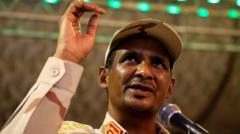The United States has taken a strong stance against the Sudanese paramilitary group Rapid Support Forces (RSF) by accusing it of genocide and imposing sanctions on its leader, Mohamed Hamdan Dagalo, known as Hemedti. US Secretary of State Antony Blinken announced that sanctions were enacted due to Dagalo's involvement in "systematic" atrocities against the Sudanese populace during a conflict that has now lasted 20 months.
Blinken highlighted horrific acts attributed to the RSF and allied militias, including the murder of innocent civilians, brutal sexual violence targeted at women, and the violent suppression of fleeing individuals. He stated, "Based on this information, I have now concluded that members of the RSF and allied militias have committed genocide in Sudan."
In response to these claims, the RSF condemned the US measures, asserting that they exemplified the double standards and shortcomings of the Biden administration in dealing with the ongoing crisis in Sudan. Hemedti's advisor, El-Basha Tbaeq, emphasized that such actions could exacerbate the situation and disrupt potential negotiations aimed at addressing the conflict's underlying causes.
The RSF has been engaged in armed conflict with the Sudanese military since April 2023, amidst rising international backlash over their conduct. Previous US assessments have categorized the RSF and associated militias as having committed war crimes, crimes against humanity, and acts of ethnic cleansing, particularly in the Darfur region, which has seen severe targeting of non-Arab populations. The humanitarian crisis in Sudan has escalated, with estimates of casualties reaching as high as 150,000 and millions in urgent need of food aid.
Blinken criticized both the RSF and Sudan's military as unfit to govern a future peaceful Sudan, implying that both factions bear responsibility for the ongoing violence. The sanctions imposed not only restrict Dagalo and his family from entering the US but also target several RSF-owned businesses based in the UAE, which are alleged to be helping the paramilitary group acquire weapons. The UAE has repeatedly denied claims of financing the RSF.
Analysts suggest that this US intervention could foster bipartisan support in Congress and signal the US's serious stance on the RSF ahead of potential changes in administration. Although the sanctions may not lead to immediate changes on the battlefield, they may place pressure on the RSF's regional supporters to reconsider their affiliations.
The ongoing conflict in Sudan has created one of the worst humanitarian catastrophes in the world, with starvation declared in parts of the country and millions relying on aid. The situation is further complicated by the involvement of various regional factors and the potential for mediation by countries like Turkey and the UAE.
As the international community watches closely, it remains unclear whether the recent US sanctions will provoke a meaningful shift toward ceasefire discussions or further entrench the existing divides in Sudan's turbulent political landscape.





















